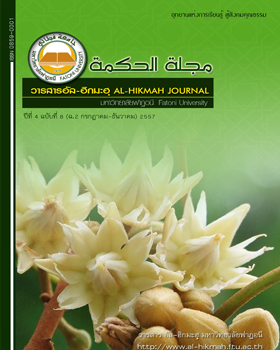Behavior of Wastes Management of Nursing Student Boromarajajonani Nursing College
Keywords:
Behavior of Wastes Management Nursing StudentAbstract
The purposes of this research were :1)to study Nursing Student’s knowledge, their understanding of the domestic solid waste management, their opinions forwards the solid waste management, and :2) to compare their behaviors on the waste management. The data were collected from 225 samples who were Nursing Student. The data were analyzed by employing percentage, mean, standard deviation.Person’Product Moment Correlation Coefficient was used to find the relation between the knowledge, the understanding about the solid waste management, the opinions forwards the waste management and the waste management behaviors. According to the study, the majority of the samples’age are less than 25 years old. A questionnaire has been applied as a research tool to assess waste management.This questionnaire is divided into 5 sections; 1. General information of participants, 2. A basic understanding of waste management, 3. Opinions on the criteria of waste management, 4 The conduct of waste management, 5. Problems and suggestion reports of waste management.
The results of this study were:1) the majority of the population have the knowledge and the understanding about the solid waste management at a moderate level. The opinions forwards the waste management are at a high level. In overall, the population waste management behaviors are at a high level. When each aspect was considered, it was found that three aspects which obtained the highest average are the collection and the waste management, the sorting and the Recycling of the garbage . For the results of the hypothesis testing, it was found that the knowledge and the understanding about the solid waste management correlated with the waste management behaviors.
A comment has been made that the students at Boromarajonani Colledge of Nursing need to obtain competency and proficiency of the essential knowledge for 21st century, especially the understanding of efficiently environmental management. The nursing students have been expected to comprehend thoroughly the correlation between the increase of environmental problems, which cause by incorrect solid waste disposal, and the rise of health problem issues. Since the people’s health problems have been affected largely by environmental problems, the waste management and environmental development policies need to be issued and applied to Boromarajonani College of Nursing, including surrounding communities. The continuous participation of nursing student following those policies might promote a promising cooperation for waste management in the future.
References
นโยบายและแผนทรัพยากรของชาติและสิ่งแวดลอม, สำนักงาน. 2547. การจัดการทรัพยากรและสิ่งแวดลอมเพื่อความสมดลุยในการพัฒนา.ม.ป.ท.
สุวิมล ภักดิ์พิบูลย.2535. ปัจจัยที่มีอทิธิพลต่อพฤติกรรมของแม่บ้านในเขตกรุงเทพมหานครต่อการกําจัดขยะมลูฝอย.วิทยานิพนธสงัคมศาสตรมหาบัณฑิต สาขาสิ่งแวดลอมศึกษา.มหาวิทยาลัยมหิดล.
วิรัช ชมชื่น. 2537. พฤติกรรมการจัดการขยะมูลฝอยของประชาชนในเขตเทศบาลเมือง นครปฐม.วิทยานิพนธสงัคมศาสตรมหาบัณฑิต สาขาสิ่งแวดลอมศึกษา.มหาวิทยาลัยมหดิล.
นพวรรณ ธีระพันธ์เจริญ. 2553. โครงการการวิจัยเชิงปฎิบัติการอย่างมีส่วนร่วมของเยาวชนในการบริหารจัดการขยะมูลฝอยกรณีศึกษา โรงเรียนสาธิตประถม มหาวิทยาลัยราชภัฎพระนครศรีอยุธยา. วารสารเพื่อการพัฒนาเชิงพัฒนาเชิงพื้นที่.ปีที่2 ฉบับที่ 4มีนาคม- เมษายน.
ปรีชา อุยตระกูล. 2553. บทปริทัศน์โครงการการวิจัยเชิงปฎิบัติการอย่างมีส่วนร่วมของเยาวชนในการ บริหารจัดการขยะมูลฝอยกรณีศึกษา โรงเรียนสาธิตประถม มหาวิทยาลัยราชภัฎพระนครศรีอยุธยา. วารสารเพื่อการพัฒนาเชิงพัฒนาเชิงพื้นที่.ปีที่2ฉบับที่ 4มีนาคม- เมษายน.
บุญธรรม กิจปรีดาบริสุทธิ์. 2535. ระเบียบวิธีวิจัยทางสังคมศาสตร์.กรุงเทพฯสามเจริญ พานิช.
ธิดา ฉันทศิริรัตน์, ณรงค์ ศรีสวัสดิ์, ตายูดิน อุสมาน, วิชิต เรืองแป้น. 2556. ความคิดเห็นของพนักงานเก็บขนขยะมูลฝอยต่อการจัดการขยะมูลฝอยในเขตเทศบาลนครยะลา เทศบาลเมืองปัตตานี และเทศบาลเมืองนราธิวาส. วารสารสิ่งแวดล้อมกับการพัฒนา ปีที่1 ฉบับที่3 กันยายน – ธันวาคม.
Bandura, A. 1977. Social Learning Theory. New Jersy : Prentice- Hall .
Bloom, BenJamin. S., Hastnas, T. Thomas and Madaue, George. F. 1971. Handbook on Formation and Summatic of Student Learning. New York : McGraw - Hill.
Cronbach, J.L. 1972. The Dependability of Behavioral Measurement; Theory of Generalizability for Scores and Profiles. New York .
Willey. Elifson, K., Runyon R.P. and Haber, A. 1998. Fundamentals of Social Statistics. (3rd ed.). Singapore: McGraw – Hill.
Levin, R.I. and Rubin D.S. 1993. Statistics for Management. (6th ed.) New Jersy : Prentice- Hall.
Levin& Rubin. 1993:24 Alshuwaikhat,M. H. and Abubakar, I. (2008). An integrated approach to achieving campus sustainability:assessment of the current campus environmental management
practices, Journal of Cleaner Production. 16, 1777-1785.
Lukman, R., Tiwary, A. and Azapagic, A. 2009. Towards greening a university campus: The case of the University of Maribor, Slovenia. Resources, Conservation and Recycling. 53, 639–644.
Simkins, G. and Nolan, A. 2004. Environmental management system in universities. Occasional paper for the environmental association for universities and colleges (EAUC).



